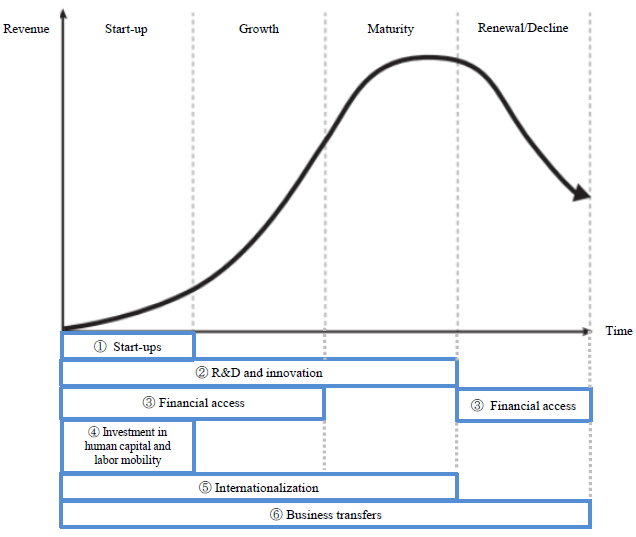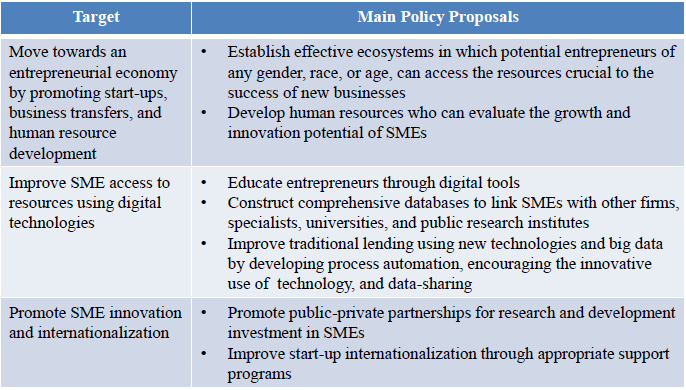Introduction
Prior to the G20 Osaka Summit held on June 28 and 29, 2019, the T20 (Think 20) Summit was held in Tokyo on May 26 and 27. T20 is an official G20 engagement group (meaning a group of leaders in their field that operate independently from governments to provide objective assessments and advice to G20 leaders in the form of policy proposals) made up of experts and think tank personnel from G20 member and non-member countries, and is positioned as the G20 "idea bank." Ten task forces were established to deliberate on 10 policy issues related to the main topics of the G20 Osaka Summit, and a communiqué (joint announcement) summarizing the policy proposals from each task force was released at the T20 summit.
Both T20 and G20 are international conferences, and therefore, not all policy proposals will be applicable to all countries due to differences in the conditions of the participating countries. It has been said that the SME policy handled by the T20 SME Policy Task Force, for which the Research Institute of Economy, Trade and Industry served as secretariat, addresses a large variety of issues as a result of differences in national conditions. At a minimum, however, with regard to SME policy, both the G20 and T20 summits shared as universal values the principles of the Sustainable Development Goals (SDGs) adopted by the United Nations such as providing high-quality education, promoting industrialization, and encouraging innovation. In this column, I evaluate the policy proposals made by the T20 SME Policy Task Force in terms of their applicability to the SDGs and examine the importance of long-term perspectives in policy making.
The Importance of SME Policy for Each Country
In OECD countries, SMEs account for 99% of businesses, approximately 60% of employment, and 50% to 60% of value added. They are essential for maintaining and reinforcing the vitality of national economies and achieving sustainable and inclusive growth. Due to limited resources, high risk, and information asymmetry (market access, relationships with large firms, and so on), however, many SMEs face various challenges related to issues such as innovation, human resource development, and financing.
At the same time, advancing digitization and globalization and other factors are changing the environments of SMEs. These environmental developments are shared globally, and if appropriate actions can be taken, further growth of SMEs can be expected. On the other hand, if opportunities are neglected, the gap between businesses that respond appropriately and those that do not, is likely to expand. Providing support for these issues and for environmental changes that will achieve the universal objective of growth and development of SMEs is fundamental to SME policy.
Policy Proposals from the T20 SME Policy Task Force
In light of the environmental changes described above, the T20 SME Policy Task Force prepared six policy briefs (policy proposals) addressing the challenges faced by SMEs at each stage of the corporate lifecycle (see figure). The topics of these policy briefs are: (1) start-ups, (2) R&D and innovation, (3) financial access, (4) investment in human capital and labor mobility, (5) internationalization, and (6) business transfers. The policy briefs present directions for evidence-based SME policy and include good practices.

In addition, the T20 communiqué summarized and organized three goals (see table) for proposals relating to SME policy: (1) move towards an entrepreneurial economy by promoting start-ups, business transfers, and human resource development, (2) improve SME access to resources using digital technologies, and (3) promote SME innovation and internationalization; which were then treated with individual policy briefs. Throughout the process, discussion was not limited to the individual interrelated policy proposals, and a comprehensive review was conducted.

T20 SME Policy Task Force Policy Proposals and SDGs
In this part of the column, I evaluate the T20 SME Policy Task Force policy proposals in terms of their applicability to the SDGs to confirm the objectives and the direction of responses underlying the SME policy.
Transforming Our World: 2030 Agenda for Sustainable Development adopted by the United Nations General Assembly in September 2015 sets 17 sustainable development goals and 169 targets. The T20 SME Policy Task Force policy proposals addressed a number of them including targets on education, innovation, improving access to financial services, and expanding access to global value chains. The goals of the international community, as seen in the SDGs, are in line with the direction of SME policy, indicating that the policy is applicable around the world.
However, the SDGs do not contain many references to the use of digital technology. This is believed to be because telecommunications infrastructure is still being developed in the least developed countries. However, the SDGs do set as a target universal and low-cost Internet access in least developed countries. If information and communication infrastructure is developed in these countries and utilization of information and communication technology advances, dealing with digitalization will become a crucial issue not only in developed and emerging countries, but universally within the international community. Currently in least developed countries, there are limited opportunities to employ good practices in higher education, capital procurement, and so on, through the use of digital technologies, but if least developed countries were to engage in backcasting (investigating measures by working backwards from a vision of a desirable future), it would be possible for these countries to adopt the good practices of developed countries as examples of the near future.
Conclusion
Good practices can be used as references for specific investigations into responsive measures that can address immediate problems. It is not easy, however, for countries with different economic conditions, legal systems, and so on to adopt good practices from other countries "as-is." Furthermore, in a time when the pace of change in digitalization is so rapid, good practices soon become obsolete. Nevertheless, good practices are specific measures that achieved positive results in a specific region. Accordingly, rather than models that can be adopted without modification, good practices have the potential to be used as reference information for understanding the stances and directions that should be adopted when confronting problems.
So far, I have argued the universality of SME policy, which are said to be diverse, from the perspectives of the T20 SME Policy Task Force policy proposals and the SDGs. The task force makes other recommendations relating to the fundamentals of SME policy such as considering the bases of public support (e.g., backing challengers rather than backing losers and picking up winners). When proposing policy, emphasis is placed on the importance of quantitative evidence of the effects of the policy. There is a recent political trend that favors pursuing short-term results, but since the change is so rapid, in order to achieve sustainability while dealing with uncertainty, I think that the importance of policy making from long-term perspectives is increasing, because, as is stated in the 2030 Agenda, we should aim to achieve the 17 Sustainable Development Goals and 169 targets before 2030.


